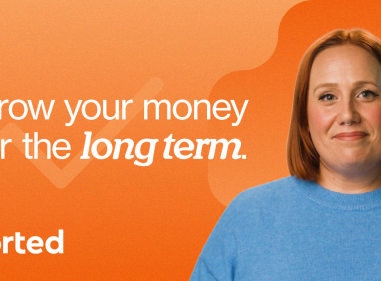
Planning & budgeting
Saving & investing
KiwiSaver
Tackling debt
Protecting wealth
Retirement
Home buying
Life events
Setting goals
Money tracking
Plan your spending with a budget
Getting advice
Studying
Get better with money
What pūtea beliefs do you have?
How to build up your emergency savings to cover unexpected costs
How to save your money
How to start investing
Find a financial adviser to help you invest
Your investment profile
Compound interest
Net worth
Types of investments
Term deposits
Bonds
Investment funds
Shares
Property investment
How KiwiSaver works and why it's worth joining
How to pick the right KiwiSaver fund
Make the most of KiwiSaver and grow your balance
How KiwiSaver can help you get into your first home
Applying for a KiwiSaver hardship withdrawal
How to use buy now pay later
What you really need to know before you use credit
How to get out of debt quickly
Credit reports
Know your rights
Pros and cons of debt consolidation
Credit cards
Car loans
Personal loans
Hire purchase
Student loans
Getting a fine
What happens if I start to struggle with moni?
How to build up your emergency savings to cover unexpected costs
Cryptocurrency
How to protect yourself from fraud and being scammed
About insurance
Insurance types
Insuring ourselves
Wills
Enduring powers of attorney
Family trusts
Insuring our homes
Losing a partner
Redundancy
Serious diagnosis
How to cope with the aftermath of fraud
Separation
About NZ Super – how much is it?
When you’re thinking of living in a retirement village
How to plan, save and invest for retirement
Manage your money in retirement
Find housing options in retirement
Four approaches to spending in retirement
Planning & budgeting
Saving & investing
How to build up your emergency savings to cover unexpected costs
How to save your money
How to start investing
Find a financial adviser to help you invest
Your investment profile
Compound interest
Net worth
Types of investments
Term deposits
Bonds
Investment funds
Shares
Property investment
View all
KiwiSaver
Tackling debt
How to use buy now pay later
What you really need to know before you use credit
How to get out of debt quickly
Credit reports
Know your rights
Pros and cons of debt consolidation
Credit cards
Car loans
Personal loans
Hire purchase
Student loans
Getting a fine
What happens if I start to struggle with moni?
View all
Protecting wealth
How to build up your emergency savings to cover unexpected costs
Cryptocurrency
How to protect yourself from fraud and being scammed
About insurance
Insurance types
Insuring ourselves
Wills
Enduring powers of attorney
Family trusts
Insuring our homes
Losing a partner
Redundancy
Serious diagnosis
How to cope with the aftermath of fraud
Separation
View all
Retirement
Home buying
Reading time: 6 minutes

There are many kinds of investments out there, each with its own level of risk and return.
The higher the potential return, the higher the risk that we might not get all our money back. So it’s good to have a mix of different investment types to spread risk and get the results we want. And it's important to do our homework and get investment advice so we understand the risks before handing over our money.
In this guide, we take a brief look at the most common kinds of investments, as well as a few of the lesser-known ones.
Savings accounts with New Zealand’s major banks are one of the most common and least risky ways to store money for the short term. Credit unions and building societies also offer savings accounts.
When we deposit money in an account we are actually lending it to the bank, which pays us some interest in return. The interest rate is relatively low, so savings accounts are not the best option for long-term growth. Find out more in our guide to bank savings.
Like savings accounts, term deposits also pay interest. The difference is that we agree to lend money to the bank for a fixed period of time such as 6 or 12 months, in return for a higher rate of interest.
Sometimes we can’t withdraw the money during the term of the investment. In other cases we can, but we get paid a lower rate of interest. Term deposits are sometimes called ‘fixed interest’ investments. Find out more in our guide to term deposits.
A bond is like an IOU issued by a government, council, or company. We lend them money for a number of years, and they promise to pay a certain interest rate – called a coupon. The level of risk involved when investing in bonds depends on whoever’s issuing them.
Unlike term deposits, we can sell bonds early. However, the price we will get can go up and down. Bonds are also sometimes called fixed interest investments. Find out more in our guide to bonds
When we buy a share, we’re buying a small part of a company. If that company makes money, we may be paid a share of the profit, called a dividend. Like house prices, share prices are generally expected to go up over time and give a ‘capital gain’ on our money when we sell. However, prices can fall in value as well. Find out more in our guide to shares.
Most investors should aim for a mix of investments to smooth out the ups and downs in value that typically happen
Returns from investing in property come from rental income and from any increase in the value of property over time – called capital gain. Some people view their own home as an investment because it may grow in value; however, it doesn’t bring in the income that letting property to other individuals or businesses does. It is also important to factor in the interest paid on a mortgage when assessing the potential for capital gain. We can invest in commercial property directly, or through managed funds. Find out more in our guide to property investment.
A managed fund is a financial product that buys a number of shares and other investments such as property, term deposits and cash. The buying decisions are made by expert managers. KiwiSaver is an example of this investment type. All of us in KiwiSaver are already investing in a type of managed fund.
When we buy units in a managed fund we are spreading our savings across a range of shares or other investments within the fund. That means that our money is 'diversified’ and our eggs aren’t all in one basket. Find out more in our guide to managed funds
Alternatives is a broad term often used to describe types of investments that fall outside the standard asset classes of cash, bonds, shares and property. Alternatives include commodities, currency and derivatives.
These types of investments don’t pay interest or dividends, but do increase and decrease in value, which can result in a capital gain. The value of commodities often moves in the opposite direction of other asset classes (e.g. when share prices go down, gold often increases in value, and vice versa), so investors sometimes buy them to try to protect their money.
As well as being used to buy goods and services, foreign currency is also used as an investment. Currency investors are looking for higher interest rates overseas, or hoping exchange rates will move in their favour resulting in a capital gain. Investors, including managed funds, may also use currency to protect, or ‘hedge’, other investments that are invested overseas. The Financial Markets Authority has more information about forex trading.
Derivatives are generally only used by more sophisticated investors, such as managed funds. This can be a confusing and complex area of investing. However, derivatives are built on a fairly simple concept - allowing people to protect themselves, or ‘hedge’, against future price movements. For example a farmer can fix the price today, for the milk they will supply in the future. While at the same time, a supermarket owner can fix the price now for the milk they will receive in the future.
Professional investors still use derivatives for this purpose, but can now also use them to invest more efficiently.
Other alternative investment types can include things such as private equity, hedge funds, fine wine, exotic cars and stamps. There are different reasons for buying each one, but, as with all investments, their value can go up or down.
Investing by lending our money on a peer-to-peer lending platform or participating in equity crowdfunding are other ways of investing and earning a return. The Financial Markets Authority (FMA) has more information and peer-to-peer lending.
Capital notes, perpetual subordinated notes and other hybrid securities have some features of both bonds and shares. They're often issued by well-known banks, but they are generally riskier and may not be suitable for many. Here’s more about capital notes from the FMA.
Head to our guide on finding out your investor type. Knowing what type of investor you are will help you understand which investments are best suited to your goals.
Video
Most of us get our money growing by saving and investing in a fund, like KiwiSaver or other managed funds.…

Guide
When we buy a bond, we’re lending money to a government, council or company.

Guide
Lots of New Zealanders own rental property – it has been a popular form of investment over the years. The…

Guide
One of the best habits we can get into is “paying ourselves first” and making it automatic. The more we…

Guide
At Sorted, we’re keen to see you getting ahead financially and growing your money for the long term. Now generally,…

Guide
Simply put, net worth is the difference between the value of what we own and the total amount that we…

Guide
Investing is all about buying things that put money back into our pockets. Sound intimidating? It’s really not. Those of…

Guide
Einstein called it the ‘eighth wonder of the world’. He was talking about compound interest, which supercharges our savings and…

Guide
Instead of investing directly and doing it all ourselves, we can invest in a managed fund where our money is…

Guide
When we buy a share, we're buying a small part of a company and a share in any profit the…

Use verification code from your authenticator app. How to use authenticator apps.
Code is invalid. Please try again
Don't have an account? Sign up
Or log in with our social media platforms


A free account gives you your very own space where you can save your tools and track your progress as you get ahead.
Or sign up using Google:


